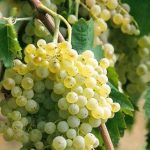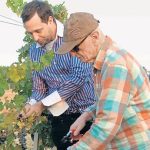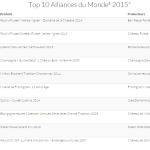Ninth show in a row: international wine, delicatessen and cuisine fair VinDel. Every year it attracts more participants and visitors to Maribor, so the town of Stara Trta (400 year old vine sort) in that afternoon becomes, as Dejan Bayer, director of the SloVino company and organiser of the event would say, the European capital of chose aromas and tastes.
The exhibition section in the new hall of Draš hotel beneath Pohorje, enabling the expansion of the festival, together with the education programme VinDel Academy, SloVino successfully upgrades and affirms the bridge between suppliers and consumers of quality delicacies on the plate and in the glass. The ninth VinDel took place in a large hall with 244 stands, with suppliers from 17 countries, among them Croatia.
I went joyfully to Maribor, as I’ve known the show for several years and always saw it in the best light, but this time, although the fair of delicacies and precious drinks is still well organised and richer than before, I came home downhearted. Due to an incident, which was bound to happen eventually.
It was an incident connected to Terrano and I would say, a consequence of our either clumsy or unprepared, negligent or cringe-worthy negotiators during Croatia’s ascension to the EU (there is a theory that Croatia relinquished Terrano to Slovenia to gain a faster membership), but also partially responsible is the Istrian winegrowers and winemakers association Vinistra which, maybe overly intoxicated with commercial success of the base Malvasia, ignored other local wine aces and proved careless in legalisation and true protection of its other two territorial trump cards (Terrano and Momjan Muscat), along with Istrian Malvasia.
In Maribor I met two Istrian winegrowers/winemakers as exhibitors – Klaudio Tomaz and Ivan Damjanić. A rumour says the director of the Vinakras winery from Sežana, upon seeing Tomaz’s label which had the name Terrano on it, and considering Slovenia managed to protect something that is usually impossible – a sort title as a wine name (imagine someone protecting the sort name Chardonnay or Cabernet Sauvignon), reported the situation, an inspector showed up and created a report. Tomaz is now expecting a misdemeanour charge.
Winemakers of the Croatian part of Istria – when the Slovenian EU protection came to light, allowing only Slovenian producers to label their wines Terrano – protested individually, while some proclaimed they would still label their wines Terrano, no matter what. For a while it seemed the state was working on abolishing this unfavourable protection, but form the Maribor example we can see nothing was done. Certain Istrian winemakers did continue labelling their wines as Terrano even after the 2013 harvest. Then the issue dies down, with some hoping time would solve the problem. Only to now prove how troublesome it was for Croatia not to protect its winemakers. This example shows how rebels, even when completely correct and especially when standing alone, do not fare well. It all shows it’s good to fight together, pressuring institutions to correct problems in time. What are the odds for subsequent actions for the Croatian Terrano? Maybe small, maybe none…
The absurdity and irony of the Slovenian protection is primarily legalised usurpation, claiming a sort name which is, in legality, everyone’s property, and secondarily using the usurped title to produce a wine from . another sort. True, closely related, but still different according to DNA analysis.
Fact is the Slovenian Kras region has traditionally used the word Terrano for the local red wine, but before there were modern methods of genetic diagnostics Terrano and Refošk were considered to be the same sort, and until recently they used the adjective Kras, so the full name was Kras Terrano. This clearly and effectively positioned the wine. So Kras winemakers, not belonging to Istria, had no real reason to fear growing competition from Croatian Terrano sort. Lately Slovenian labels rarely or not at all show the Kras label as a geographical term or origin: is this a desire to impose on the world that the Terrano sort exists only in Slovenia, on Kras?
The absurdity and irony lie in another case: lately many state officials have been proclaiming how important it is for Croatian agricultural and food products, especially regional, local specialties to be included in our tourism offer. It took a long time for a critical mass of decision makers to catch on to this idea and begin realising it. In this context – especially since several Istrian winemakers have offered Terrano in superior variations – it must be viewed as a Croatian feature and a strong trump card in tourism.
Everyone, even Slovenians who spoke up, support Tomaz… But, if we do not abide by the law, legislation is not needed and without it and rules comes chaos. The state is expected to adequately create stable framework for business, which ours failed to do, easily due to Vinistra not rearing itself. Within those basic and necessary frames created by the state there should be strong associations made up of producers caring for the interests of their sector and territory. What did Vinistra, in the business sense, do for Terrano?
If the competent persons in Croatia and producers of successful brands still act leisurely, with the second group unwilling to join forces – although Vinistra is a rare winemakers association with at least some contours of business dimensions – it is easily possible not to realise to the full extent Istrian Momjan Muscat, Tribidrag in Dalmatia, Graševina in Slavonia…
My impression is this time at VinDel there were more food exhibits than previous years. Interesting products were on display by Marko Dušević from Zadar, who owns a company for the processing of seashells and seafood into gastronomic delicacies with an added value. He boasted – smoked mussels! At the same table was, with a Malvasia, wine house Monte Rosso of Slovenian owners whose vine are in the Croatian part of Istria. The Zvonko Bogdan winery from Palić also put on a opulent show, with enologists Srđan Luković and Frenchman Florant Dumeau, founded by Zvonko Bogdan and two friends, said director Stevo Orašanin. With two wines, 8 Tamburaša and Život Teče, offered were also an exclusive white Icon Campana Albus 2013 (Sauvignon), filled in 3.146 bottles, and Icon Campana Rubimus 2013, with half Merlot and half Cabernet Franc, filled in 6.024 bottles.
For the original and more from Suhi u Čaši blog on wine, click here.










